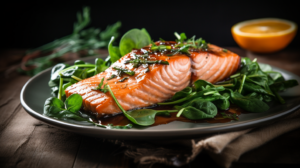Are you looking to boost your fitness and improve your overall health?
One important factor to consider is your testosterone levels. Testosterone plays a crucial role in men’s health, influencing muscle growth, bone density, and even mood.
Fortunately, there are dietary choices you can make that can help increase your testosterone levels and optimize your fitness goals.
When it comes to boosting testosterone, food can be a powerful tool. Certain foods have been shown to naturally increase testosterone levels in men. By incorporating these foods into your diet, you can support hormone production and enhance your fitness journey.
Whether you’re a seasoned athlete or just starting out on your fitness journey, making smart dietary choices can make a significant impact on your testosterone levels and overall well-being.
Key Takeaways
- Testosterone plays a crucial role in men’s health, including muscle growth, bone density, and mood.
- Certain foods, such as lean meats, fatty fish, fruits, and vegetables, can naturally increase testosterone levels.
- Consuming foods rich in zinc, healthy fats, and protein can support testosterone production.
- Lifestyle factors like regular exercise, sufficient sleep, and stress management also impact testosterone levels.
The Role of Testosterone in Men’s Health
You may think you’re already a picture of perfect health, but let me tell you, testosterone plays a crucial role in men’s overall well-being.
It’s not just about the muscles and the physicality that testosterone provides, although those are important too. Testosterone also affects your mood, energy levels, and even your cognitive function. It’s like the secret ingredient that keeps you feeling vibrant and alive.
So, if you want to be the best version of yourself and serve others to the best of your abilities, it’s essential to pay attention to your testosterone levels.
Now, you might be wondering how you can naturally boost your testosterone levels. Well, the good news is that it starts with your diet.
Certain foods have been shown to have a positive impact on testosterone production. For example, foods rich in zinc, such as oysters, beef, and pumpkin seeds, can help increase your testosterone levels. Additionally, incorporating healthy fats into your diet, like avocados, nuts, and olive oil, can also support testosterone production.
Foods that Boost Testosterone Levels
Consuming certain edibles can enhance testosterone production in males. If you’re looking to boost your testosterone levels, there are a variety of foods that can help.
Start by incorporating more lean meats into your diet, such as chicken and turkey. These meats are high in protein, which is essential for testosterone production.
Additionally, try adding more fish to your meals, particularly fatty fish like salmon and tuna. These fish are rich in omega-3 fatty acids, which have been shown to increase testosterone levels.
In addition to meats and fish, don’t forget about your fruits and vegetables. Pomegranates, for example, are known to stimulate testosterone production. Other fruits like bananas and avocados are rich in potassium and healthy fats, which can also support testosterone levels.
And when it comes to vegetables, cruciferous vegetables like broccoli, cauliflower, and Brussels sprouts are great choices. They contain a compound called indole-3-carbinol, which helps to balance estrogen levels in the body and promote healthy testosterone production.
Nutritional Strategies for Supporting Testosterone Production
Boosting testosterone production can be achieved through specific nutritional strategies. By incorporating certain foods into your diet, you can support the production of this important hormone.
One key strategy is to consume foods that are rich in zinc, as this mineral is essential for testosterone production. Oysters, beef, and pumpkin seeds are all excellent sources of zinc.
Additionally, foods that are high in healthy fats, such as avocados, nuts, and olive oil, can also support testosterone production. These fats are important for hormone production and can help to maintain optimal levels of testosterone in the body.
Another strategy is to ensure that you are getting enough protein in your diet. Protein is necessary for the body to produce testosterone, so it should be a staple in your meals. Lean meats, fish, eggs, and dairy products are all great sources of protein.
Include plenty of fruits and vegetables in your diet, as they provide essential vitamins and minerals that support overall health and hormone production. In particular, foods high in vitamin D, such as salmon, mushrooms, and fortified dairy products, can help to boost testosterone levels.
Lifestyle Factors that Impact Testosterone Levels
A critical factor in maintaining optimal testosterone levels is maintaining a balanced and active lifestyle. By incorporating certain lifestyle habits into your daily routine, you can help support healthy testosterone production and ensure you’re operating at your best.
Here are three lifestyle factors that can have a significant impact on your testosterone levels:
- Regular exercise: Engaging in regular physical activity, such as weightlifting, cardiovascular exercises, and high-intensity interval training, can help boost testosterone levels. Aim for at least 150 minutes of moderate-intensity exercise or 75 minutes of vigorous-intensity exercise per week. Remember to mix up your workouts to target different muscle groups and keep your body challenged.
- Sufficient sleep: Getting enough quality sleep is essential for maintaining healthy testosterone levels. Lack of sleep can disrupt hormone production and lead to decreased testosterone levels. Aim for seven to nine hours of uninterrupted sleep each night to optimize your hormonal balance.
- Stress management: Chronic stress can negatively impact testosterone levels. Find healthy ways to manage stress, such as relaxation techniques like meditation or deep breathing exercises. Engaging in hobbies, spending time with loved ones, and seeking support from a therapist or counselor can also help reduce stress levels and support optimal testosterone production.
Balancing Macronutrients for Optimal Hormonal Balance
It’s like finding the perfect combination of ingredients in a recipe to achieve optimal hormonal balance – you need to balance your macronutrients just right.
Just like a chef carefully measures out ingredients to create a delicious meal, you too can create a harmonious hormonal environment in your body by paying attention to the macronutrients you consume.
First and foremost, it’s important to understand the role of macronutrients in hormonal balance. Protein, for example, is essential for testosterone production. Including sources of lean protein like chicken, fish, and tofu in your diet can help support healthy testosterone levels.
Additionally, healthy fats such as avocados, nuts, and olive oil are essential for hormone production. These fats provide the building blocks for hormones and help regulate their production.
Lastly, don’t neglect carbohydrates. While they often get a bad reputation, carbohydrates are necessary for energy production and can help support healthy testosterone levels. Opt for complex carbohydrates like whole grains, fruits, and vegetables to fuel your body and keep your hormones in check.
So, next time you’re preparing a meal, think of it as an opportunity to nourish your body and serve yourself the perfect combination of ingredients for hormonal harmony.
Frequently Asked Questions
Can low testosterone levels in men be reversed through dietary changes alone?
Yes, you can reverse low testosterone levels in men through dietary changes alone. You can naturally boost your testosterone levels and improve your overall fitness by making smart food choices, like consuming more zinc-rich foods and healthy fats.
Are there any specific foods that can directly increase testosterone production in men?
Yes, there are specific foods that can directly boost testosterone production in men. Include foods like oysters, tuna, eggs, and spinach in your diet. These nutrient-rich choices can naturally increase your testosterone levels and enhance your overall well-being.
What are the lifestyle factors that have the most significant impact on testosterone levels in men?
To maximize testosterone levels, focus on these lifestyle factors: regular exercise, especially weightlifting; stress management through activities like meditation or yoga; adequate sleep; a balanced diet rich in protein, healthy fats, and zinc; and maintaining a healthy weight.
Is there a specific macronutrient ratio that is recommended for optimal hormonal balance in men?
For optimal hormonal balance in men, it is recommended to follow a macronutrient ratio of 40% carbs, 30% protein, and 30% healthy fats. This balance supports testosterone levels and helps you serve others at your best.
Can excessive exercise or physical activity negatively affect testosterone levels in men?
Excessive exercise or physical activity can actually decrease your testosterone levels. Picture this: you’re pushing your body to the limit, but instead of getting stronger, your hormones take a hit. Take it easy and find balance for optimal testosterone levels.














